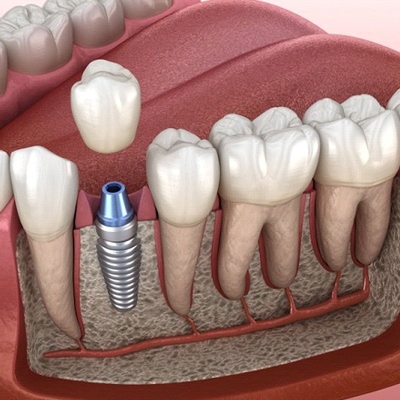Dental Implant Failure & Salvage – McKinney, TX
Saving Your New Pearly Whites
When you replace your missing teeth with dental implants, you’re making an investment that should last a lifetime. Unfortunately, it doesn’t always pan out that way. Although dental implants are successful in more than 95% of cases, there’s still a tiny chance that they could fail at any point after placement. Here at Archway Dental, Dr. Deval Parmar wants your new smile to stand the test of time, so if you experience any signs of a failed dental implant in McKinney, TX, please call our office right away. We’ll make saving your new pearly whites our top priority!
Why Do Dental Implants Fail?

While it’s rare for dental implants to fail, it can occur for many possible reasons. The most common of these is peri-implantitis – a form of gum disease wherein bacteria infect the gum tissue surrounding the implant. Without treatment, the infection could even weaken the bone that supports the post, eventually causing it to destabilize and fail. Peri-implantitis often occurs as a result of poor oral hygiene, which is why brushing and flossing are still crucial when you have dental implants in McKinney.
Dental implant failure can also occur as a result of a traumatic injury to the face, mouth, or jaw. Events like this can dislodge the implant from its proper place in the jawbone. The implant may also fail if it is unable to integrate with the bone tissue in the jaw. The risk of this increases if a patient has certain medical conditions, such as cancer or type 2 diabetes, that inhibit the healing process. Lastly, tobacco use is another possible reason why dental implants fail. Not only does tobacco double or even triple the risk of gum disease, but it also lowers the body’s ability to fight infections, so any infections that you do develop worsen more easily.
Signs of a Failed Dental Implant

A dental implant can fail in the few months following placement (as it’s still merging with your jawbone), but it can also fail several years or even decades down the line. In either case, you should seek immediate care from our dental office if you notice any of the following symptoms:
- Intense pain or lingering discomfort near the implant
- Difficulty chewing food with the implant
- Bleeding, pus, or swelling in the area
- Feeling like your implant is “loose”
- Consistent bad breath or foul taste in your mouth
How Dental Implant Salvage Works

Depending on the cause of your implant failure, and how quickly you come into our office, we might be able to treat the issue without removing the implant at all. For example, we may only need to perform a deep cleaning and/or prescribe antibiotics. However, if an infection has progressed to the point where the underlying gum and bone tissue are extensively damaged, we may need to take out the implant, treat the infection, and begin the dental implant process all over again. When you visit us, Dr. Parmar will examine your mouth and jaw and determine the best course of action, with the ultimate goal of being as conservative as possible while saving your smile.

